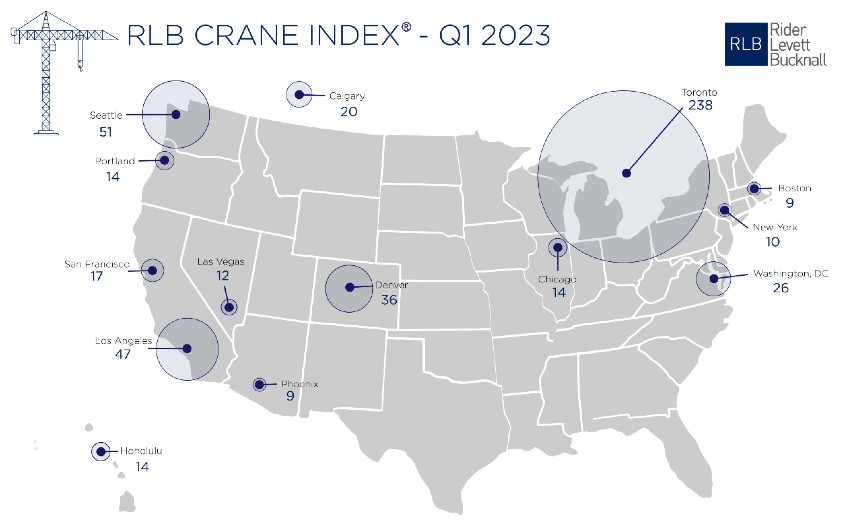Crane activity is at a record high across 14 major cities in North America and Toronto is leading the pack, according to newly released data from the biannual Rider Levett Bucknall (RLB) Crane Index.
As it stands, Toronto is currently home to the most cranes with 238 erected. Among them include 139 residential, 35 commercial, 33 mixed-use, 10 hospitality and 7 educational buildings.
For Q1 2023, overall activity across all markets increased by more than seven per cent (34 cranes).
“The overall crane count for Toronto has increased by eight cranes, although over the last six months, 31 projects have been closed out.” the report states. “This most recent crane count includes 37 brand-new projects.”
A significant increase is attributed to the residential sector, which added 13 cranes in Q1, while activity dropped for commercial projects.
Calgary, the only other Canadian city analyzed, has 20 cranes overall. Activity there is down by only one crane since the end of last year. “Even with skilled labor shortages, high material costs, and limited availability of supplies and equipment, the city continues to flourish, and considerable investments have been made in Calgary’s future,” the report highlights.
“While the city expects a cooler, more balanced housing market this year, it is still investing in infrastructure to make these places “development ready” for more than 190,000 people. In addition, a $500 million expansion to the BMO Centre is also underway.”
According to RLB’s Quarterly Construction Cost Report, construction investment is flourishing in Calgary. Alberta’s housing starts are predicted to slow, but the projection in 13.5 per cent greater than the five-year average before the pandemic. The government is also investing $2.3 billion over the next three years to build and upgrade classrooms.
As Ontario plans to upgrade critical transportation projects and build 1.5 million more homes over 10 years, the forecast is “extremely favourable”; however, some projects could hamper other sectors. “Residential construction is being displaced by large infrastructure projects, which will probably cause completion delays to residential projects,” the report states

Infograph courtesy of Rider Levett Bucknall.







